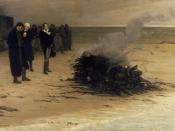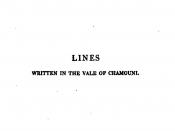Poetry was very common in England during the late 1700's and early 1800's. Poets at this time were thought to be very intelligent and sensitive. The poets of this time were called the younger Romanticists. The older Romanticists no longer supported radical causes or championed the oppressed. The younger Romanticists poets quickly and noisily took up the cry for liberty and justice (Reed, xxvi). Three prime examples of such poets are George Gordon Byron (Lord Byron), John Keats, and Percy Bysshe Shelley. These men were all pushing for liberty, appreciation of natural beauty, and justice for the oppressed. The only sad thing is that only one of the three lived to the age of thirty, and he died at the age of thirty-six.
George Gordon was born on Jan. 22, 1788, in London. At 17 he entered Cambridge University. He read much literature but cared little for other subjects. The public reacted unfavorably to Byron's often scandalous conduct, and in a fit of temper he left England for Italy.
There he wrote additional cantos for 'Childe Harold'; 'Manfred,' a verse play; and 'Don Juan,' a half-romantic, half-humorous poetic version of the old Spanish story. Byron became interested in Greece's struggle to free itself from Turkish rule, and he went to Greece to help organize the revolt. He died of a fever at Missolonghi (now Mesolongion) on April 19, 1824, at the age of thirty-six. Byron influenced the youth of his day more than any other Romanticist. 'Byronism' was a mood adopted by thousands of young men (Frye, 619-626).
John Keats was born in London, England, on Oct. 31, 1795. He did not spend his early years close to nature, as did many poets, but in the city of London. There was, however, born in him an intense love of...



Romantic poets
I liked this essay. It would have been worth mentioning a little more about each. Byron a famous man a best seller by any standards
2 out of 2 people found this comment useful.